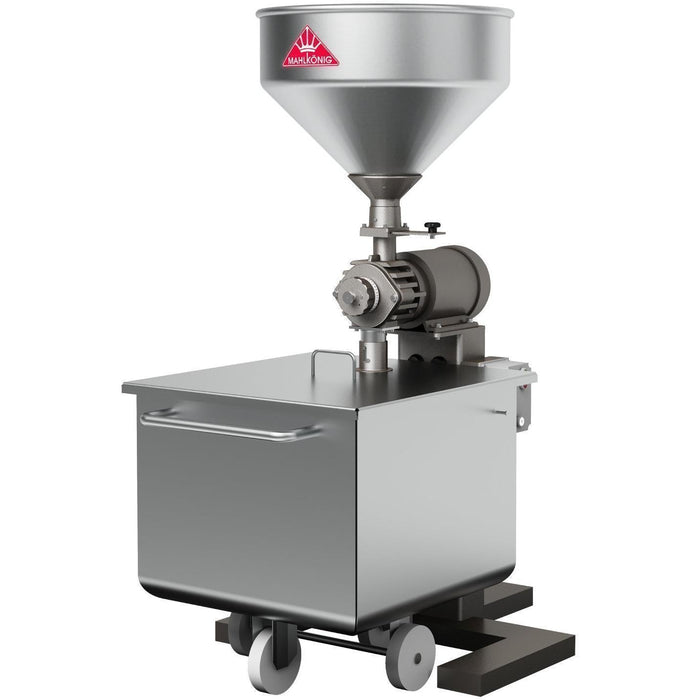Industrial Coffee Grinder Guide: Increase Effectiveness and Top Quality
In the affordable landscape of coffee manufacturing, selecting the ideal industrial coffee grinder plays a crucial function in enhancing both performance and product high quality. Comprehending the subtleties of different grinder types and key features-- such as customizable grind settings and durable construction-- can substantially affect the last taste account of the coffee.
Comprehending Mill Kinds
When picking an industrial coffee grinder, understanding the different kinds offered is vital for optimizing both flavor removal and operational efficiency. Both primary kinds of grinders are blade mills and burr grinders. Blade grinders use sharp blades that slice coffee beans right into irregular sizes, causing unequal removal and potentially unfavorable flavors. While blade mills are often more budget friendly and appropriate for small-scale operations, they are typically not suggested for industrial use.

Ultimately, picking the best kind of grinder is indispensable to keeping top quality and performance in coffee manufacturing, making it important for organizations to buy top notch burr grinders for ideal results.
Trick Attributes to Consider
Choosing a commercial coffee grinder requires careful factor to consider of numerous vital attributes that can substantially affect both efficiency and the overall coffee experience. Among the primary facets to review is the grinding device. Burr mills are usually liked over blade mills, as they provide a consistent grind size, which is crucial for ideal extraction and taste.
Another important feature is the mill's capacity. Relying on the volume of coffee you need to procedure, select a design that can manage your needs without sacrificing speed or quality. Furthermore, think about the work settings provided. A functional mill with numerous setups enables you to customize the work size to different brewing approaches, boosting the coffee's taste profile.
Evaluate the grinder's sound level, specifically in a busy coffee shop or production setting, where extreme sound can be disruptive. Investing in a grinder that balances these functions can substantially enhance both functional effectiveness and the quality of the coffee offered.
Optimizing Grinding Refine
To accomplish the finest results in coffee prep work, maximizing the grinding procedure is necessary. The grind dimension substantially influences removal, flavor, and overall top quality of the made coffee.


In addition, monitoring the grinding speed can enhance the procedure. Slower grinding typically creates less heat, protecting delicate tastes and aromas. Alternatively, much faster grinding might produce too much heat, negatively affecting the coffee's quality.
Upkeep and Treatment Tips
Correct upkeep and care of industrial coffee mills are important for making sure optimum performance and longevity. Normal cleansing is the foundation of maintenance; residue accumulation can influence flavor and grinding efficiency. It is a good idea to clean the grinder after find here each usage, cleaning down the exterior and eliminating any type of coffee premises from the burrs.
Furthermore, examine the grinding burrs for wear and tear. Boring burrs can jeopardize grind consistency, so they should be changed as essential. Industrial Coffee Grinder. Occasionally calibrating the mill is also critical, as this maintains the wanted work size for different brewing approaches
Lubrication of moving parts need to be executed according to the producer's requirements, as this lowers friction and extends the life of the devices. It is crucial to blog here make use of food-grade lubes to ensure safety and security and conformity with wellness guidelines.
Last but not least, maintain the mill in a completely dry and stable atmosphere to protect against corrosion and deterioration. By adhering to these maintenance and care tips, drivers can improve the effectiveness of their commercial coffee mills while guaranteeing high-grade result and prolonged operational life.
Return on Investment Evaluation
Evaluating the roi (ROI) for commercial coffee grinders is critical for organizations looking why not try these out for to enhance their coffee manufacturing capacities. A thorough ROI evaluation helps determine the monetary stability of buying high-grade mills, enabling organizations to weigh the initial expenses versus prospective gains.
To carry out a detailed ROI analysis, organizations should consider numerous crucial aspects. First, evaluate the purchase rate of the grinder, consisting of installment and any necessary adjustments to existing framework. Next, calculate operational expenses, including power intake, maintenance expenditures, and labor performance renovations. High-performance grinders frequently cause decreased grinding time and raised throughput, which can dramatically boost performance.
Additionally, consider the effect on product quality. Industrial Coffee Grinder. Superior mills produce an even more constant grind dimension, which can boost flavor profiles and customer fulfillment, eventually driving sales. By boosting the high quality of the end product, services can validate higher pricing, leading to enhanced revenue
Final Thought
In recap, a commercial coffee grinder plays an essential function in improving both performance and product high quality within coffee production. Eventually, the calculated investment in a reliable grinder contributes significantly to boosted earnings and competition in the coffee industry.
In the competitive landscape of coffee manufacturing, picking the ideal industrial coffee grinder plays a pivotal duty in improving both performance and item quality. The two primary types of mills are blade grinders and burr grinders. Within the burr mill category, there are level burr mills and cone-shaped burr grinders, each with its benefits. Burr grinders are generally favored over blade mills, as they offer a consistent work size, which is essential for ideal extraction and taste.
In recap, an industrial coffee mill plays a critical duty in improving both efficiency and item high quality within coffee production.
Comments on “Find the Best Deals on Industrial Coffee Grinder Models Right Now”